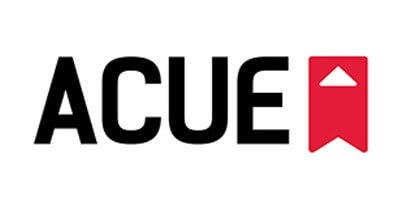 NIU is proud to have a second cohort of faculty members completing the Association of College and University Educators’ (ACUE) certification on effective teaching practices. NIU launched a partnership with ACUE in summer 2020 to support innovative pedagogy, allowing NIU faculty a new opportunity to explore and implement research-based approaches to teaching designed to improve student engagement and persistence and promote deeper learning. Faculty who complete the ACUE program can earn a nationally-recognized certificate in effective college instruction, endorsed by the American Council on Education.
NIU is proud to have a second cohort of faculty members completing the Association of College and University Educators’ (ACUE) certification on effective teaching practices. NIU launched a partnership with ACUE in summer 2020 to support innovative pedagogy, allowing NIU faculty a new opportunity to explore and implement research-based approaches to teaching designed to improve student engagement and persistence and promote deeper learning. Faculty who complete the ACUE program can earn a nationally-recognized certificate in effective college instruction, endorsed by the American Council on Education.
The first cohort began in August 2020 and will be completed in May 2021. Progress reports indicate that more than 98% of the faculty cohort members strongly agree that the teaching practices they are implementing are helpful and relevant to their work. NIU faculty are also implementing almost three times the number of teaching practices compared to colleagues at other institutions across the nation.
“We’re really pleased where we’re at today with the ACUE program and look forward to continuing the partnership with ACUE into the future,” said Jason Rhode, executive director of the Center for Innovative Teaching and Learning. “There is significant evidence that faculty who participate in extended faculty development (like the ACUE course) translate that learning into course materials and teaching approaches that lead to student learning gains.”
Reflections from the course provide evidence of the positive impact of the ACUE program at NIU:
One faculty member said: “I selected the practice ‘keep to one major topic.’ I chose to focus on this practice because in the past I had a tendency to focus on covering as much content as possible in each class period instead of tailoring them around major topics,” said one faculty member. “Focusing on one major topic seemed to increase student participation during our synchronous meetings. I have continued using it over the past few weeks and have found that it makes class sessions more structured and easier to follow for students.”
“Being explicit in sharing the aim/rationale and setting expectations early was completely successful,” said another faculty participant. “The students appreciated the details provided and are looking forward to the assignment.”
Students concur. “Now that I have a better understanding of what is expected right now, I feel some relief,” said one student.
A faculty member’s compared outcomes before working with the cohort with outcomes achieved after implementing teaching techniques from the ACUE modules.
“This past summer, for the first time, I taught a summer session course 100% online and asynchronously. I learned a lot from my summer experience, but really was not satisfied with the outcomes,” they said. “As I became more involved with the ACUE program, I gained the opportunity to improve my approach to planning and facilitating discussions for my classes. The ideas and suggestions from the ACUE program made sense and were easy enough to incorporate. When I went back and compared the results from the summer session, I noticed a definite change for the better.”
Yvonne Johnson, multimodal teaching coordinator in the Center for Innovative Teaching and Learning and facilitator for both cohorts said, “It is rewarding to hear positive feedback from faculty implementing research-based best practices for teaching in their courses. The ACUE certification program is rigorous and we are already seeing the benefits at NIU.”
NIU launched a second cohort of faculty participating in the ACUE effective teaching practices certification program in January 2021. The second cohort includes 27 faculty from many disciplines. The participants have completed the first section of the program, which focused on creating an inclusive and supportive environment. They are currently learning and implementing teaching techniques that promote active learning. Jocelyn Santana and Jane Pappas of the Social Justice Education office will be presenting two sessions on culturally responsive teaching to the cohort this semester. The second cohort is scheduled to complete the certification program early in the fall of 2021.
Members of the second cohort include:
- Rouzbeh Chegeni, Health Studies
- Veysel Demir, Electrical Engineering
- Rachel Donegan, Special and Early Education
- Wenlian Gao, Finance
- Lydia Gerzel-Short, Special and Early Education
- Lindsey Hawkins, Family and Consumer Sciences
- Jehan Hill, Counseling and Higher Education
- Jinhak Kim, Operation Management and Information Systems
- Xueying Lu, Physics
- Andrew Mamo, College of Law
- DeAnna Harris-McKoy, Family and Consumer Sciences
- Candace Medina, World Languages and Cultures
- Jonathon Merritt, Engineering Technology
- Allison Michaelis, Geography
- Micah Morton, Anthropology
- Helen Nagata, School of Art and Design
- Marcella Otto, Kinesiology and Physical Education
- Molly Pasley, Special and Early Education
- Nicholas Pohlman, Mechanical Engineering
- Alesha Porisky, Political Science
- Nahal Salimi, School of Interdisciplinary Health Professionals
- Kimberly Shotick, University Libraries
- Thomas Skuzinski, Public Administration
- Jifu Tan, Mechanical Engineering
- Venumadhav Korampally, Electrical Engineering
- Lei Zhou, Finance
- Peitao Zhu, Counseling and Higher Education
